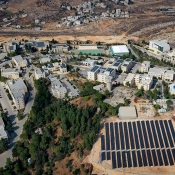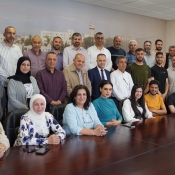Speech of Dr. Khalil Hindi, President of Birzeit University at the fundraising dinner held by Friends of Birzeit University in London on Thursday
Ladies and gentleman,
It is an honour and a privilege for me to address this distinguished gathering in such an august institution. I am grateful to both Friends of Birzeit University and Clifford Chance for this opportunity and for organising and hosting this event.
Many weighty tomes have been written on the relationship between education and development. All I can do in the 10 minutes allotted to me is to give pointers and indicators. I will, of course, be talking with reference to Palestine and will be taking ‘development' to mean both social and economic development.
As you are all well aware, we Palestinians have for the past 63 years been condemned to living scattered around the world, as well as in three separate population concentrations: in Israel behind the 67 lines, in the West Bank and in the Gaza Strip. While one would hope that this fragmentation would not endure for much longer, but would be at least partially remedied, for now one would have to contend with present reality. I will, therefore, talk about the refugees, then the Gaza Strip and finally the West Bank, leaving aside the peculiar case of the educational constraints placed on the education of Palestinians in Israel and the educational opportunities open to them, partly because that is a topic that in itself requires a long speech.
Enough of preliminaries! Let us turn our attention to refugees. As of January 2010, UNRWA cites nearly 1,400,000 registered refugees in camps and nearly 3,400,000 registered refugees not in camps. Forced to live in inhuman conditions, while deprived of all material resources and means of production, most refugees had and still have to rely either on muscle power or brain power. While chances for making a decent living through sale of raw labour have been severely circumscribed by laws, regulations, and various discriminatory practices in the host countries, education offered the only escape route out of a life of poverty, emptiness, stultification and drudgery. Thousands upon thousands of Palestinian refugees, including some present here today, took this liberating route. In the process, they earned humanity for themselves and their families and contributed immensely to the development and prosperity of the larger Middle East and beyond. Moreover, through remittances, they helped alleviate the hardship of life in and around the camps and even enable relatives to escape their confines.
In the Gaza Strip, approximately 1.6 million people, of whom almost 1.0 million are UNRWA-registered refugees, live hemmed in a small strip of coastal land whose area is just less than 140 square miles. The Strip has been subject to an almost hermetic Israeli blockade that has made it into an enormous open prison for the men and women, old and young, and children who live there. Under such circumstances, it would be something of a travesty to talk of education and development. Nonetheless, should this intolerable blockade be lifted, the situation in the Strip would be akin to that in the West Bank in relation to education and development, although admittedly the conditions in the Gaza Strip are far more atrocious.
Turning to the West Bank, where an estimated 2.5 million people live, one can cite the benefits that are normally cited by the general literature on education and development, for they in a broad-brush sense do apply.
Notwithstanding rapid changes in employment conditions, the future macroeconomic environment, technical innovation and skills obsolescence, through education the individual acquires transferable and negotiable competences and skills that have a transactional value and a direct positive bearing on average income throughout life. Moreover, throughout the world, and the West Bank is no exception, the differential in earnings based on educational attainment has increased over time, which, in fact, constitutes the principal evidence for the emerging knowledge economy.
In addition, educated individuals gain other economic benefits. Education makes individuals more entrepreneurial and adaptable through increased flexibility in the face of change and difficulties; thus providing a good protection against unemployment. Remarkably, proximity to institutions of higher learning even induces greater rates of job growth, not only for university graduates, but also overall. And there are other than economic benefits, including enhanced social skills, greater awareness of human achievement, appreciation for cultural diversity, better health and generally a happier life.
Added to the benefits accruing from education to individuals, there are societal benefits. Having a workforce with greater educational attainment and skills leads to enhanced worker productivity, which in turn translates into higher output and incomes for the economy. Broadly and across economies of various degrees of development, a greater labour force share of university graduates is positively correlated to higher wages by all workers, as well as to higher productivity of enterprises. Again broadly, much of economic growth can be directly attributed to roles played by research innovation at institutions of higher education and the greater absorptive capacity of a labour force with greater proportions of university graduates.
Apart from economic societal benefits of education, the list of other benefits is quite long. These include: more rational and efficient consumer choices; more extensive job searches, resulting in a better match between individuals and enterprises, which, in turn, enhances efficiency; higher savings rates; better and more extensive research and development activities; less reliance on welfare and public assistance; less criminal behaviour and lower incarceration rates; increased charitable giving; and higher social cohesion. Indeed, since more educated individuals are less influenced by populist rhetoric and less prone to falling prey to obscurantist influences, an educated populace is the foundation of a democratic society.
Perhaps most important are the intergenerational effects that accrue from education. The educational attainment and cognitive development of children are positively affected by the educational attainment of parents (first-generation effects), and the health of the individual, their spouse, and their children are positively related to educational attainment.
There is ample evidence that education has a beneficial impact on development across various economies in varied states of development in all geographic regions. However, what makes education even more crucial in the case of the West Bank is the fact of Israeli occupation, and, despite all appearances to the contrary, it is still very much and very oppressively there.
Israel has consistently applied a policy of de-development of the West Bank. De-development is the process that undermines or weakens the ability of an economy to grow and expand by preventing it from accessing and utilizing critical inputs needed to promote internal growth beyond a specific structural level. Over the decades of occupation, Israel, in a meticulously planned effort, transformed the economy of the West bank into an auxiliary of the Israeli economy. Notably, de-development does not preclude outward signs of prosperity, such as increased levels of income and higher rates of consumption expenditure and even generally improved standards of living. What de-development does is fostering structural integration of West Bank economy into Israel's, harming the former and benefiting the latter. This integration makes the economy of the West Bank increasingly vulnerable to and dependent upon events inside Israel, while imposing a severe lack of growth in the west Bank by denuding it of all bases of a real economy. In other words, de-development may lead to certain forms of economic prosperity without any real economic development. It is worth noting that this form of economic relationship is much more pernicious than the classical dependencies of weaker economies on stronger economies.
In fact, the origins of the policy of de-development may be found in the early Zionist thinking which dreamt up a future for the indigenous population based on hewing of wood and drawing of water. Clearly, only through education can the indigenous Palestinian population escape such or a similar fate. Not that we consider hewing, in our case of stone rather than wood, and drawing of water to be demeaning in any way. What we seek to avoid is a future where we are consigned to doing just that. Indeed, we want our land and our water so that we can have our fair share of hewing and drawing. In other words, we seek to be a normal people and would also refuse a fate like that dreamt up for us by a recent Rand Corporation / MIT study which envisions for us a life based on high technology spent in cyberspace, so that there is no need to solve problems of land and water.
Unlike in most other settings, education is additionally important for Palestinians in a very specific way. In short, over decades of exile and living under occupation, Palestinian society has become brutalized, with loss of systems of authority and a high degree of internalised violence. The socialisation role of education is hence crucial and will even become more so should circumstances develop towards normalization of our life and conditions.
Finally, lest we forget, let us remind ourselves of the purpose of all education. It is to enable people to enjoy life. God knows that there is so much misery and oppression in the life of Palestinians to break the heart. Yet, in the words of the great late Palestinian poet, Mahmoud Darwish, there is on this earth much that is worth living for. Clearly, instilling love of life, rather than exaltation of death, is a challenging task in the case of Palestine, but it is a task that education must undertake with determination if we are to survive all the trials and tribulations that have been foisted upon us.
Ladies and gentlemen,
While struggling for a place under the sun that we can truly and sovereignly call home, as well as for the right to education, we Palestinians are heartened and our burden lightened by the tremendous solidarity shown towards us by all kinds of people in all kinds of places. You presence here today and your continued support for Friends of Birzeit University (FOBZU) are testimony to such solidarity. By supporting FOBZU, you are indeed contributing to life and to living it decently.
Thank you!






